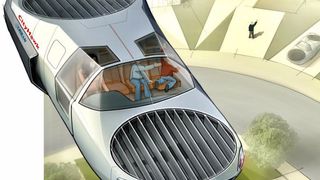Real flying cars could take to the skies by 2022 - beating the not-real Jetsons by 40 years
Hope to be flying over cities in the not-too distant future

Just like robot butlers and personal jetpacks for all, flying cars are a technology we’ve all been promised since we were kids, mainly thanks to the Jetsons.
Well, finally, they could be taking a step closer to the realms of reality thanks to Metro Skyway.
The Israeli company has unveiled new plans for a four-person flying car that it claims could be sky worthy as early as 2022.
Dubbed CityHawk, the flying car will reportedly utilise vertical take off and landing technology thanks to an internal thrust-producing rotor system embedded directly within the fuselage of the vehicle itself.
The company, a subsidiary of Tel Aviv-based Urban Aeronautics, has based the CityHawk on more than a decade of flying car research that resulted in the Cormorant, a flying vehicle designed for military use.
Instead of carrying military equipment, however, the CityHawk will pilot passengers around city set-ups, and be capable of hitting speeds of 115mph and fly for an hour at a time, cruising between buildings and below power lines.
I did it Skyway
It won’t be a vehicle you’ll be able to fly yourself, however, acting instead as a flying taxi, assuming it passes aviation safety standards that is.
Get daily insight, inspiration and deals in your inbox
Get the hottest deals available in your inbox plus news, reviews, opinion, analysis and more from the TechRadar team.
Although the vehicle will initially run off jet fuel, Metro Skyway has claimed the car could eventually run off hydrogen, assuming the emissions-friendly fuel can be made safe enough.
“Using hydrogen simply requires crash-proof fuel tanks, but there are quite a few hydrogen-powered road vehicles that are already in use and a number of reasons why it may even be safer than jet fuel,” Janina Frankel-Yoeli, vice president for marketing at Urban Aeronautics, told The Verge.
Metro Skyway isn’t the only company working on flying cars. Earlier this year Uber hired a former NASA engineer in order to pursue its own flying taxi plans.
